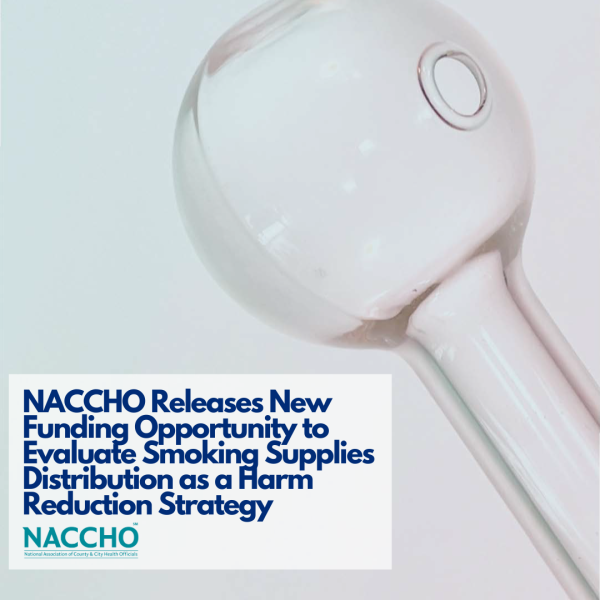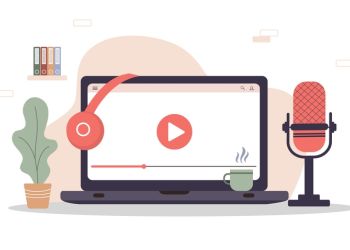In partnership with the Centers for Disease Control and Prevention (CDC), NACCHO is pleased to announce a new funding opportunity to support the evaluation of smoking supplies distribution as a harm reduction strategy.
Through this funding opportunity, NACCHO will provide up to $38,000 to approximately four syringe services programs (SSPs) to evaluate the distribution of smoking supplies as a harm reduction strategy. Applicants are encouraged to explore topics such as how distributing smoking supplies has affected program reach and engagement or injection drug use and health outcomes among participants. A secondary goal of this project is to identify promising models and practices related to the distribution of smoking supplies. Methods can include analyzing existing program data or collecting and analyzing new data (e.g., through surveys or focus groups with program participants). For additional information, view the Request for Applications (RFA) here.
Applications must be submitted via email by Friday, October 13th at 11:59 PM PT. For more information, see the Application Instructions below. NACCHO hosted an optional, informational webinar for potential applicants on Wednesday, September 27th from 2 – 3 PM ET, to review the RFA and respond to questions. Although no new information was shared during the webinar, you can find the recording and slides here.
This funding opportunity is open to non-profit county, city, or tribal health departments, healthcare facilities, or community-based organizations that currently distribute syringes and smoking supplies (at minimum, pipes/glassware). Applicants must have an active registration with SAM.gov. Please note that this funding is intended to support evaluation, not implementation, and cannot be used to purchase smoking supplies. For additional information on eligible organizations and allowable expenses, please see the RFA here.
Application Instructions:
To apply for this funding opportunity:
- Complete the Application Form
- Complete the Budget Template and Budget Narrative. If you plan to offer incentives to participants (e.g., for participating in surveys, focus groups), you will also need to review, complete, and submit the Gift Card and Incentive Approval Form. See the Budget Guidance for additional instructions on developing the budget and budget narrative.
- Complete all documents required for a complete contracting package, including:
- Contract cover sheet- this link has been updated as of 10/4/23 due to a typo in the previous version, however, you can submit either version of this document (i.e., if you already completed the version with the typo, you can still submit that version) this link has been updated as of 10/4/23 due to a typo in the previous version, however, you can submit either version of this document (i.e., if you already completed the version with the typo, you can still submit that version)
- Certification of Non-debarment
- FFATA Form
- Vendor form
- W9
- Proof of active registration with SAM.gov (see question 4 in the contract cover sheet)
- Proof of fringes and/or indirect costs (if higher than 10%) in the budget, if applicable (see the contract cover sheet and budget guidance documents for more information)
- If applicable, letters of support from partner organizations
- Submit the application form, budget, budget narrative, and contracting package by Friday, October 13th, 2023, at 11:59 PM PT by emailing [email protected] with the subject line “Submission – Evaluating the Distribution of Smoking Supplies as a Harm Reduction Strategy.”
Frequently Asked Questions:
Eligibility
Do I have to be a syringe services program (SSP) to apply?
Yes, your organization needs to be an SSP, defined as any organization that distributes syringes for harm reduction purposes. Please see the eligibility section of the RFA for more details.
Do I have to distribute smoking supplies to be eligible for this opportunity?
Yes, you must already be distributing smoking supplies, as this is an evaluation opportunity and not an implementation opportunity. Please see the eligibility section of the RFA for more details.
How long do you need to have been providing smoking supplies?
There is no requirement regarding how long you have been distributing smoking supplies, as long as you are actively distributing them. However, if your program is very new, your application may be less competitive as you may have less participants or program data.
NEW (10/3/23): Our organization does not directly distribute syringes or pipes but we fund/contract with SSPs to support their syringe and smoking supplies distribution programs. Are we eligible to apply?
If you include at least 1 of these SSPs in your budget as a subcontractor or include a letter of support from at least 1 of them describing how they plan to partner with you on this project (e.g., by providing you with their smoking supplies distribution program data to analyze) then you can apply for this funding opportunity.
Project Activities
Do you have guidance on appropriate sample sizes for surveys or focus groups? / Do you have guidance on how many participants you are hoping that agencies will engage in data collection activities?
The appropriate sample size depends on the data collection method (e.g., survey vs focus group) and for surveys in particular, the size of your participant population (e.g., how many participants you see per month/year). Please propose what you think is feasible in your application, however, you can also contact Kat Kelley ([email protected]) with information regarding your proposed data collection method and the volume of clients you see (overall and for your smoking supplies program) if you would like to discuss further.
How many of the evaluation questions listed under the Goals, Activities, & Requirements section do we need to address?
At minimum, you should propose or select one evaluation question. You can propose or select multiple if you can reasonably address them within the project period.
Can you give more detail on how data will be used? And how detailed does the data need to be? Can it be more macro data? Also, a little about dissemination reports?
You will not have to submit your data to NACCHO. Rather, you will submit a final project report and dissemination materials that synthesize your data—for example with graphs/charts, tables, and text. NACCHO will work with each grantee to define their deliverables, including their dissemination reports, as part of the contracting process. When completing the Application Form (i.e., question 26) please consider with whom you would like to share the findings of your project and NACCHO will work with you to ensure that the dissemination materials you create are useful to your organization and partners.
Would you talk about the focus group?
According to CDC, a focus group is “a group interview of approximately six to twelve people who share similar characteristics or common interests” during which “a facilitator guides the group based on a predetermined set of topics.” Focus groups can provide “in-depth information on perceptions, insights, attitudes, experiences, or beliefs.” They can be used independently or to complement quantitative (numeric/measurable) data.
NEW (10/3/23): You mentioned that this project is evaluation, not research. Are you expecting a full informed consent process?
This grant is focused primarily on using existing data collected on services by the SSP (e.g., adminstrative data, program/client management, or SSP implementation data). In cases where grantees plan to collect additional data (e.g., through surveys or focus groups with clients about the impact of the SSP’s services) we would expect ethical guidelines to be established and followed that protect all participants from harm and deception as per guidelines in human subjects research. This resource from the University of Washington’s Support Harm Reduction Programs initiative highlights ethical considerations for data collection at harm reduction programs.
NEW (10/3/23): Are you expecting a full informed consent process?
This grant is focused primarily on analyzing existing data collected on services provided by the SSP. In cases where applicants plan to collect new data (e.g., through surveys, focus groups), we would expect ethical guidelines to be established and followed that protect all participants form harm and deception as per guidelines in human subjects research.
Application & Selection
The question, “Characterize the geographic area served by your organization” in the Application Form does not have a word count but could be at least a page. Is that acceptable?
While this would be acceptable, applicants are encouraged to provide just a few words or sentences in response to this question (e.g., which counties, cities, reservations, etc. you serve at minimum).
Is there a preference for urban vs rural or suburban communities?
No.
Will you look more favorably towards SSPs already analyzing data? Or already analyzing health outcome data?
NACCHO will consider whether applicants have the staff capacity and data to accomplish their proposed project within the project period. SSPs that are already analyzing their smoking supplies data won’t necessarily be more competitive—in fact, this project may give SSPs an opportunity to analyze data they’ve been collecting but haven’t had the opportunity to analyze yet.
While NACCHO is interested in projects that explore the health benefits of distributing smoking supplies, we recognize that it may be difficult to assess within this project period. Consequently, NACCHO encourages applicants to review the Goals, Activities, & Requirements section of the RFA to see other potential topics they can explore. In particular, examining injection behaviors (e.g., has distributing smoking supplies affected frequency of injection or syringe sharing) among participants may help demonstrate the potential for improvements in health outcomes.
Use of Funding
Can we subcontract with a partner agency?
Yes.
Can you include both fringe benefits and indirect costs in your budget?
Yes.
Are outreach supplies (e.g. pipes, syringes) under $5,000 an allowable expense?
No. This funding cannot be used to purchase pipes, syringes, or other harm reduction supplies. Funds should be used for evaluation, not implementation.
Can funding be used to purchase food for focus group participants?
Food expenses for participants to attend project-related meetings may be allowable under certain circumstances, including for meals provided during working meetings and where a substantial portion of participants are traveling from more than 50 miles away from the meeting site.
Can we use gift cards for participation in focus groups?
Yes, you can provide modest incentives (e.g., gift cards) for participation in focus groups. See the Budget Guidance and Gift Card and Incentive Approval form for more information.
NEW (10/3/23): Can we provide gift cards to Amazon as incentives?
Yes. See the Budget Guidance and Gift Card and Incentive Approval Form for more information.
NEW (10/4/23): Are branded gift cards allowed?
Yes. While an earlier version of the Contract Cover Sheet included a typo that stated branded gift cards are not allowed—they are in fact allowed. Please complete the Gift Card and Incentive Approval form if you would like to use funding for this purpose.
Other
Do you anticipate being impacted by a potential government shutdown?
No, this project should not be impacted by a potential government shutdown.




